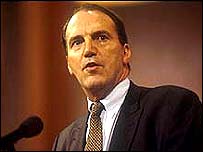
Simon Hughes, Liberal Democrat leadership contender, has admitted he has had gay relationships in the past.
"I am perfectly willing to say that I have had both homosexual and heterosexual relationships in the past," he said.
Now, that sounds like he's bisexual to me, but once again the media seem determined not to use the word "bisexual." "I'm gay too" the Sun spashes across its front page. How can our interpretaton be so differet from the facts? He's not gay, as he has said on many occasions. I wish he had the bravery to stand up and say 'I am bisexual.'
"I hope that does not disqualify me from doing a good job in public life and I propose to carry on doing that with the usual enthusiasm and determination," Hughes said.
Am I naive to think this goes without saying?
Mr Hughes said: "Nobody has a perfect life. I have never claimed I have. Very few people have simple lives."
All that is true, but why should being bi be more imperfect than being straight or gay? It's just what his sexual orientation is. I wish he could be less reticent and apologetic about himself. He is what he is. He's a single man who has had relationships with men and women. He's done nothing remotely wrong, nothing illegal, not even something like cheating on a partner. He's got nothing to be apologetic about.
I suppose it's naive of me to think a politician would stand up for what they are without worrying about what people will think.
Comments